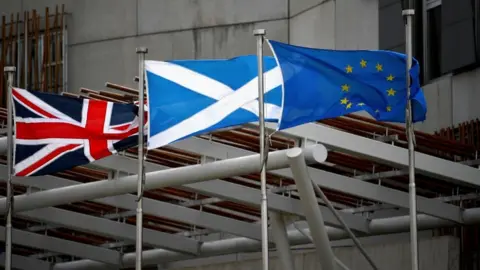Scots 'could have different Brexit deal'
 Getty Images
Getty ImagesThere is a "strong case" for Scotland having different Brexit arrangements from the rest of the UK in some areas, peers have said.
The Lords EU committee said the move could be necessary if a UK-wide deal does not reflect Scotland's needs.
It said this could include Scotland setting its own EU immigration goals after Brexit.
But the committee did not think Scotland could stay in the single market if the rest of the UK leaves.
The proposal has been a key demand of the Scottish government - but the committee said any such arrangement was likely to be "politically impracticable, legally highly complex and economically potentially disruptive to the functioning of the UK single market".
However, it said the UK government needed to recognise the fact that 62% of voters in Scotland backed the UK remaining in the EU in last year's referendum.
'Specific needs'
While they made clear they did not want new areas of powers to be devolved, the committee's report said the "specific labour market and demographic needs of the devolved nations should be accommodated in the context of Brexit".
It added: "We therefore consider that, in the event that the UK government does not secure a UK-wide agreement that adequately reflects Scotland's specific needs, there is a strong political and economic case for making differentiated arrangements for Scotland."
It highlighted the Scottish economy's reliance on workers from EU countries, particularly in sectors such as health, social care, agriculture and food and drink, and on the country's reliance on EU migration to increase its working-age population.
The report added: "We call on the UK government, in its forthcoming Immigration Bill, to look for opportunities to enhance the role of the devolved institutions in managing EU migration in ways that meet their specific needs.
"Local and regional economic and demographic needs, rather than central targets, should drive decision-making".
 Getty Images
Getty ImagesSome experts who gave evidence to the committee suggested that Scotland could have differentiated arrangements in areas such as energy policy, healthcare, justice cooperation, participation in Europol, workers' rights and working hours.
But the committee concluded that uncertainty over the outcome of the Brexit negotiations meant it was not possible at this stage to reach definitive conclusions about the feasibility or desirability of doing so.
The report said: "We reiterate that maintenance of the integrity and efficient operation of the UK single market must be an over-arching objective for the whole United Kingdom.
"But that objective does not preclude differentiated arrangements for Scotland in some areas, and nor does it justify excluding the Scottish government from the Brexit process."
The report argued that any successful Brexit settlement could not simply be imposed by the UK government, and called on it to "raise its game" by giving all of the devolved administrations a greater say through the Joint Ministerial Committee (European Negotiations).
'Needs to change'
The Joint Ministerial Committee (JMC) was set up to allow ministers from the UK, Scotland, Wales and Northern Ireland to discuss the Brexit process.
But the report said it was "clear that at a basic level its meetings are not being treated with respect or organised efficiently" and insisted that "this needs to change", with the JMC being allowed to agree common positions on the Brexit issues of most importance.
It said the UK's current constitutional arrangements meant that a large range of powers in areas such as fishing, agriculture and environmental protection will return from Brussels to Edinburgh, Cardiff and Belfast rather than Westminster.
However, it warned that the complex "overlapping and shared competences" within the devolution settlements could lead to an increased risk of clashes between the devolved administrations and the UK government, which will remain responsible for negotiating international agreements.
It also warned UK minister against using Brexit as an excuse for a "powergrab" by keeping for themselves some of the powers that should be devolved once they are returned from Brussels.
And it repeated calls for the Barnett formula to be scrapped and replaced by a funding arrangement that was based on need rather than population size in order to ensure that different parts of the UK did not lose out when their EU funding stops.
'Particularly vulnerable'
The report also warned that the Brexit debate in Northern Ireland appeared to have "undermined political stability and exacerbated cross-community divisions", contributing to the collapse of the Northern Ireland Executive.
Meanwhile, it said Wales could be "profoundly affected" by leaving the EU as the economy is "highly reliant" on membership of the single market - with the report saying it is "therefore particularly vulnerable" if UK access to this is reduced.
Lord Jay of Ewelme, a member of the committee and former head of the diplomatic service, said: "The UK government must respect the devolved institutions.
"It's not enough saying it's listening to them - it has actually got to take account of what they say and adjust its approach to accommodate their specific needs.
"Equally the devolved administrations must work with, not against, the UK government to get the best Brexit for the whole of the UK."
The Scottish government's Brexit secretary, Michael Russell, said: "Our clear position is that we want a way forward that allows Scotland to remain within the single market and this report notes the need for a specific Scottish solution.
"We will do everything we can to help deliver the best possible deal for our society and economy."
The UK government's Department for Exiting the European Union said suggestions there would be a "power grab" were unfounded.
A spokeswoman said: "We have been clear that the Repeal Bill will not take away any decision making powers from the devolved administrations immediately after exit.
"Instead, to protect the UK internal market, some decision making powers being transferred into UK law will be held temporarily to allow intensive discussion and consultation with the devolved administrations.
"As the Secretary of State has made clear, it is our expectation that the outcome of this process will provide a significant increase in the decision-making power of each devolved administration and we are committed to positive and productive engagement."
